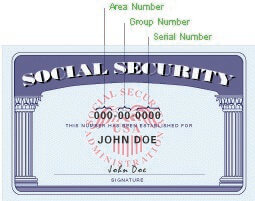For the average American, the Social Security Number holds special significance. It follows you from birth to death and can act as a key to a variety of sensitive information – bank accounts, tax returns, driver’s license information, residences, etc. However, even though you likely know your social by heart, you probably don’t know what those nine digits actually reveal. Today’s blog explores the history and significance of the social security number and how the SSN is used in the background screening industry.
A brief history of the Social Security Number
FDR’s passage of the Social Security Act of 1935 provided millions of Americans with a new financial safety net in the form of old age, disability, and survivor’s insurance, as well as supplemental security income for the elderly and disabled. The program is funded through Social Security taxes paid by employees and their employers and is available to individuals once they retire or otherwise become eligible. With the Act’s passage, the Social Security Administration (SSA) needed an efficient means to track each citizen’s earning records over a lifetime and the social security number was born. Today, social security numbers have been issued to more than 450 million people (SSA.gov).
It seems nowadays that everyone asks for your social security number. You put it on bank loans, doctor’s office paperwork, tax filings, credit card applications, student loan forms, and your driver’s license application. Many businesses ask for your SSN because it is a convenient way to identify you in their system. As a result, your social security number can now reveal all kinds of information about you, including places you’ve lived, your credit history, and maybe even medical conditions.
Dissecting the Social Security Number
The nine digit social security number is grouped into three parts– the area number, group number, and serial number.
The Area Number
The area number is the first grouping in the social security number. Originally, the area number indicated the location of the Social Security Administration office where an SSN was issued (state, territory, or possession) (SSA.gov). Individuals could apply at any office, so the area number was not an indication of where they lived or worked. This changed in 1972 when the Social Security Administration began issuing SSN’s from its Baltimore headquarters and assigning area numbers based on the applicant’s mailing address.
Anyone who applied for a social security number between 1972 and 2011 will have an area number that correlates to the mailing address listed on their application (SSA.gov). However, the area number cannot be used to determine residence since you can have mail sent to any location. In 2011, the SSA changed the way area numbers are assigned yet again to a system called “randomization.” Anyone applying for an SSN after June 25, 2011 has received a randomized area number that has no correlation to any location (SSA.gov).

The Group Number
The middle section of numbers is simply there to make administration easier for the SSA. The group number ranges from 01 to 99 and allows Social Security Numbers with the same area number to be broken into smaller pairings. Geographic data is not indicated by the group number.
The Serial Number
Similar to the Group Number, the serial number does not have any special significance to the SSN owner’s location. The serial number ranges from 0001 to 9999 and is assigned consecutively within each group number.
As you can see, your social security number does not expressly say anything about you. Even the area number, which was tied to a location for 76 years, cannot be used to accurately pinpoint a residence. So how does an employer go from having your social security number to knowing where you’ve lived, worked, and gotten into trouble? They use a background check.
Employers wishing to follow safe and prudent hiring practices are more and more often choosing to run pre-employment background screenings on potential new hires. These background screenings perform two essential functions for employers:
- First, screening allows an employer to verify that the information the candidate provided about their education, professional credentials, and work history is correct and helps avoid hiring individuals who are not, in fact, qualified for the position in question.
- Second, pre-screenings protect businesses—including their assets, their employees, and their customers—from exposure to potentially damaging criminal behavior and from lawsuits associated with negligent hiring practices.
Social Security numbers are an invaluable tool for screeners to use when performing background checks. Your Social Security number will not tell your full life story, but it does provide a critical framework that screeners and employers can use to ask deeper questions.
What Information Does the Number Provide?
First and foremost, your social security number is used to verify your identity. Your social security number is attached to one name and one birthday. If you have a common name, say like John Smith, your SSN, birthday, middle name, and other corresponding information such as driver’s license number and addresses you’ve lived together confirm that you are the John Smith in question.
Second, since social security numbers are used to track many types of personal transactions, a background check searches a variety of sources (mailing houses, public records, credit bureaus) to pull up information on an individual. Accurate Background’s Social Security Trace and Address History search goes back seven years and identifies information including current addresses, all addresses where an applicant has lived, name summaries and variations, date of birth, etc. SSN searches will also reveal your work history and credit information such as foreclosures and bankruptcies.
What Information Does the Number Not Provide?
Most significantly, and perhaps surprisingly, criminal records are not tied to SSNs. An individual’s criminal charge may or may not include their SSN, so a clean criminal record check using SSN alone is not particularly meaningful. It’s a start, but it’s by no means the whole story. However, using information gleaned from an SSN check that includes names and aliases as well as former addresses, skilled background screeners can search criminal records databases to find evidence of an individual’s criminal history. So, while your SSN by itself will not reveal a criminal history, it’s nonetheless very difficult to run a thorough criminal background check without the additional information provided by a thorough SSN trace.
It’s Ultimately About Trust
Employers primarily run background checks as a baseline for establishing trust with a new employee. While a social security number does not tell the whole story, it provides a crucial foundation for verifying identity and building critical trust, without which any background report is essentially unreliable.



